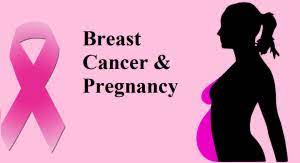Research remains an essential part of cancer care. In this blog, we will provide information about recent updates or new approvals as it applies to breast cancer written by Dr. Sharon Wilks.
Recently, I attended two conferences about breast cancer, and both covered the special issue related to Pregnancy and Breast cancer. I think we are covering this issue more frequently as it is occurring more commonly. I thought it worthwhile to share with you some current approaches in this setting. Imagine being pregnant or just having had your baby and being told you have breast cancer. The amazing women who fight the cancer battle in this setting are amongst the strongest I have ever had the privilege to care for in my career.
The rate of pregnancy and breast cancer is fairly rare fortunately, but current statistics show that the occurrence of breast cancer during pregnancy or during the post-partum period have risen since the 1960s. According to Dr. Mayer, approximately one in five breast cancers diagnosed in women ages 25-29 are diagnosed either in pregnancy or postpartum. Though, it is not entirely clear why, many who are diagnosed typically will have larger and more aggressive tumors than those of similar age. These tumors are commonly hormone receptor negative and according to Dr. Litton’s talk, about 30% will have HER 2 Neu positive or highly expressing HER 2 Neu breast tumors. According to Dr. Mayer in the Dana Farber Cancer experience, the majority of patients were stage I & II and 50% of these patients had tumors that were more favorable with HR positive & HER 2 Neu negative, while 32% had tumors that were HER 2 neu overexpressing (similar to what Dr. Litton had shared) and 18% of this patient group had Triple Negative breast cancer.
Though it is challenging treating patients in the first trimester of pregnancy, termination of pregnancy has not improved survival. Most treatments as I will share are safe to administer during the 2nd and 3rd trimesters of pregnancy.
Assessing for a diagnosis of cancer can be a challenge during pregnancy due to risk of x-rays and exposure to the infant but recent updates according to Dr. Litton show a low risk of fetal exposure (0.007-0.02 cGy) with mammogram and ultrasounds of the breast being safe. Avoidance of MRI with Gadolinum is advised, however. Typically, the work-ups include CXR (performed with shielding of the abdomen) and ultrasound of the liver for staging to determine if any metastases is present. Close support from a maternal fetal specialist is essential.
Treatments during pregnancy:
Surgery can be done but there is a suggestion of a slightly higher risk of spontaneous abortions and lower birth rate amongst those who have surgery during pregnancy. The ideal time for safer surgery is felt to occur between 8-12 weeks of gestation and after. There appears to be no difference in outcomes whether a full mastectomy versus a lumpectomy (partial mastectomy) is carried out but radiation must be delayed until the baby is born if postoperative radiation is necessary (usually this is required for patients who undergo lumpectomy). Use of standard measures for lymph node removal is safe as well.
Though there is a high risk of fetal anomalies (~15-20%) if a person receives chemotherapy during the first trimester, it is safe to administer chemotherapy during the 2nd and 3rd trimesters (risk of fetal anomalies is ~1.5%). The typical agents that are safe include Anthracyclines (Adriamycin or Epirubicin) with Cytoxan and recent updated information also support use of Taxanes (Paclitaxel, Docetaxel) during this time interval of pregnancy. Typically, chemotherapy is held around week 35 of pregnancy until after delivery to avoid risk of Neutropenia (low white blood cells) during the delivery phase to reduce infection risk to the infant/mother. Trastuzumab (Herceptin®), Methotrexate and use of Tamoxifen as a hormone blocker are not safe to use during pregnancy.
It has also been recommended that pregnancy should extend as close to term or a full-term pregnancy period of 40 weeks as possible. (There are no advantages for an early delivery; indeed more complications were seen in infants when induction occurred earlier in pregnancy.) Even with this effort, it has been observed that there are commonly lower birth weights for the infants born amongst women who receive chemotherapy during pregnancy. Though this occurs, it has also been observed that the infants do gain weight quickly post-partum, so no long-term adverse events are reported based on lower birth weights.
Radiation to the breast and chest wall is absolutely contraindicated during pregnancy.
Fortunately, survival rates are similar for women who are pregnant versus those who are not with these therapies. Several longitudinal studies for cognitive function, cardiac status and general health have been carried out on infants born to mothers who received chemotherapy according to Dr. Mayer and no evidence for a worse outcome has been reported.
I think that it is important to know that again, thanks to research and close collection of data, an individual who is pregnant and who is dealing with the diagnosis of breast cancer can be certain that life saving measures can be administered safely during pregnancy and that the prognosis overall is favorable and similar to those who are not pregnant. And importantly, if treatments are carried out during the pregnancy, there appears to be no significantly higher long-term complications in the child’s development and growth. As in any situation with cancer, it is critical to have in place a multimodality group of specialists when caring for individuals with cancer during pregnancy. We continue to strive to find better and more effective and safer ways to care for patients who are pregnant with breast cancer and encourage support for research to allow for better outcomes in this common form of cancer in young and older individuals.
Sources:
Erica L. Mayer MD MPH
Dana Farber Cancer Institute (July 16, 2022 @ the 21st Annual International Congress on the Future of Breast cancer East).
Talk entitled: Contemporary Approaches to Breast cancer & Pregnancy
Jennifer Litton, MD
MD Anderson Cancer Center (Hematology Medical Oncology Board review, October 3, 2022)
Talk entitled: Special Issues in Breast Cancer

